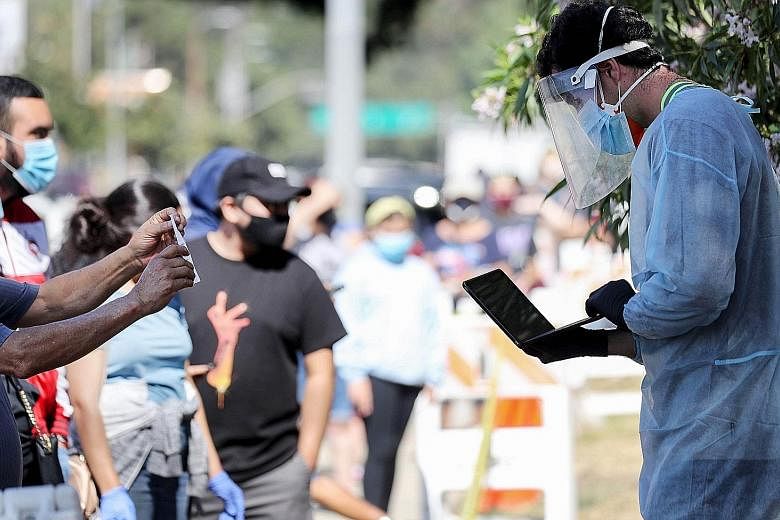After weeks of Americans staying at home and a strict regime of social distancing, the overall number of newly reported Covid-19 daily cases in the United States began to plateau in early May.
But the levelling off did not last.
The eagerness of some states to reopen their economies before the virus was suppressed proved premature.
Today, the coronavirus is surging in the south and south-west of the country. The US is reporting new highs in daily case numbers multiple times a week. On Wednesday, the country surpassed three million confirmed cases - a quarter of the world's total.
Southern states initially adamant that they would not shut down again have since been forced to pause reopening or reverse course in the face of rising case numbers and Covid-19 hospitalisations.
However, today's patients are younger than those in the initial phase of the crisis.
Doctors and nurses are once again running low on personal protective equipment while hospitals in the new hot spots of Arizona and Florida are running out of beds in their intensive care units.
Public health experts are attributing this surge to a false sense of security fuelled by failures of leadership, as Americans who did not take the virus seriously were enabled by leaders who waffled on the necessity of masks and pushed for businesses to reopen faster than they should have.
Federal guidelines that the states had to meet to reopen their economies were not strictly followed.
Dr Deborah Birx, who coordinates the White House's coronavirus task force, said that the pandemic initially hit some states hard but spared much of the rest of the country, and that leaders "thought they would be forever spared through this".
"None of us really anticipated the amount of community spread that began in our 18-35 age group... When they saw people out and about on social media, they all went out and about," Dr Birx said at an online event by the Atlantic Council think-tank on Tuesday.
Centre for Global Development senior policy fellow Jeremy Konyndyk, a vocal critic of the Trump administration's handling of the crisis, said in response: "It's an extraordinary indictment to admit that no one in the administration anticipated that reopening high-risk activities before suppressing spread - as politicians did across the Sun Belt - would produce a resurgence."
President Donald Trump has repeatedly downplayed the resurgence of the virus, insisting the case spikes are due to an increase in testing, despite public health experts and even leaders in his own party saying otherwise.
The US death toll has come down from its April and May peak of up to 3,000 a day to around 600 a day now, something that Mr Trump has given great prominence to.
But National Institute of Allergy and Infectious Diseases head Anthony Fauci warned Americans at a Tuesday event: "It's a false narrative to take comfort in a lower rate of death. There are so many other things that are very dangerous and bad about this virus."
And America has been set back in other ways.
"If we had the death rate of Germany, 80,000 fewer Americans (would have been) killed; protected healthcare workers as Singapore has, 500 healthcare workers would still be alive," wrote former Centres for Disease Control and Prevention director Tom Frieden on Twitter.
"If we masked, tested, traced as dozens of countries (have), we would have a tiny fraction of cases and our economy, schools would reopen sooner, safer," he said.
-
Complacency and confusion: WHY SOME COUNTRIES ARE SEEING A RESURGENCE
-
Less deadly but no less virulent, the coronavirus is testing governments again. Masking, testing, tracing and isolating are the mantras as nations step up vigilance against new peaks that came faster than anticipated. Can they flatten the curve? The Sunday Times reports
The Trump administration's push to reopen schools in autumn is also troubling public health experts.
Said Dr Frieden: "It's not a matter of whether we reopen schools this fall, it's how we do so safely. But we can't just charge forward - trying to open schools without accounting for and protecting students and staff."
Experts say that with strict social distancing and mandatory use of masks, America can still contain the virus - but that leaders need to choose that right path.
Baylor College of Medicine dean and infectious diseases expert Peter Hotez said: "Problem is, there's not the federal will and leadership to make this happen.
"It's so tragic. If we would do six weeks of hard work, we could open schools, colleges, maybe bring back college and professional sports. Instead, we choose a path guaranteed to fail," he said.

